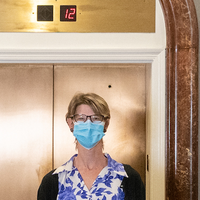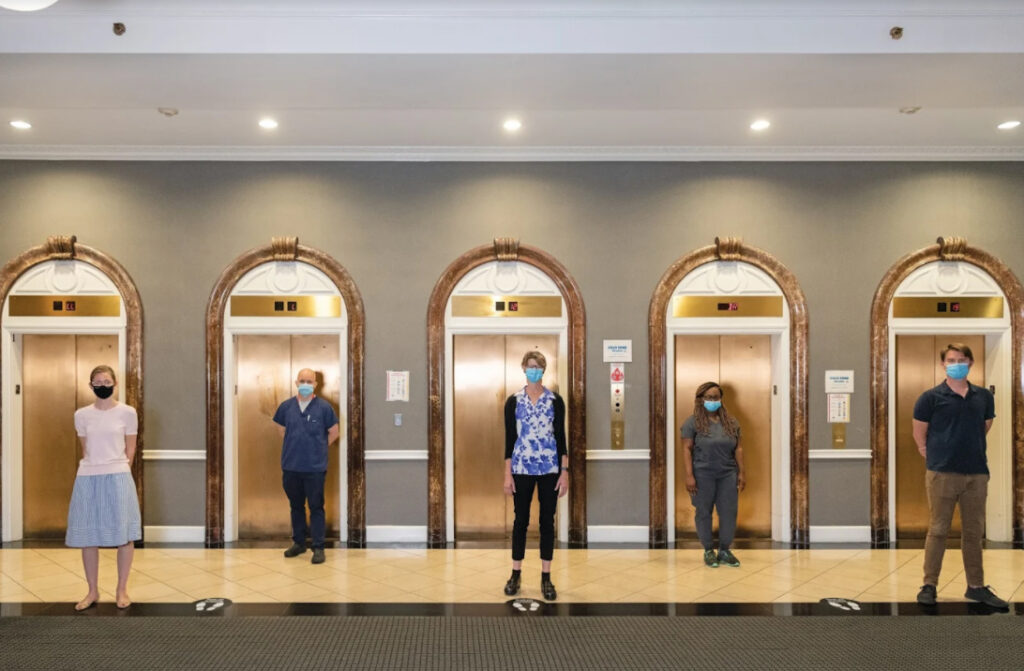 COVID-19 and the Lord Baltimore Hotel
COVID-19 and the Lord Baltimore Hotel
By Marik Moen
IN SPRING 2020, the State of Maryland, with the help of the Army Corps of Engineers, transformed the Baltimore Convention Center into to the 250-bed University of Maryland Medical System Baltimore Convention Center Field Hospital. I was living in Fairfax, Virginia, at the time but was looking for an opportunity to serve in the COVID response — an infectious disease disproportionately affecting populations who have experienced historic discrimination. You could say it was my gig.
I went to get oriented and do a few shifts. I heard some pejorative language being used to refer to people of Baltimore and knew just who could address this concern: Chuck Callahan, vice president for population health with the University of Maryland, who served in incident command leadership for the Convention Center Field Hospital. I reached out to him to share my concerns and see how I could further help the response. Within days the approach to orientation was amended. Also within days, Dr. Callahan called to ask if I would serve as director of nursing at the Lord Baltimore Hotel.
These were people who couldn’t safely isolate at home and who weren’t so sick they needed to be in the hospital.
Amid the pandemic, the newly-badged Lord Baltimore Triage, Respite and Isolation Center (LBTC) was being set up to serve as a temporary residence for people diagnosed with COVID or suspected of having it. These were people who couldn’t safely isolate at home and who weren’t so sick they needed to be in the hospital.
It was a big decision. Normally I teach and do research or help to manage nurse-community health worker programs for people living with HIV. I’m an assistant professor of family community health at the University of Maryland, Baltimore, School of Nursing. COVID was hitting the communities that I was most familiar with — but I wasn’t connected to those communities in Fairfax, where we had moved two years before. I was connected to those communities in Baltimore. Taking this on meant waylaying research and, for me initially, moving to Baltimore. My husband, Gregg Wilhelm, was within walking distance of work at George Mason University, and our daughters were in second and fourth grade. I would be putting us at risk and adding more turmoil to an already pandemic-changed life. I was worried.

We needed everybody: Marik Moen, third from left, served as director of nursing at the hotel transformed into the Lord Baltimore Triage, Respite and Isolation Center. Photo by Matthew P. D’Agostino / University of Maryland, Baltimore
LAST MAY, when I came to the Lord Baltimore, it was maybe five days before we transferred people in — more than 50 residents from homeless shelters or congregate settings that had COVID outbreaks. Notably, the Lord Baltimore was the only hotel in the city that would accept any residents with COVID at the time. We had to figure out a plan: field a team of nurses, set up protocols. We had to answer questions like: What is the clinical aspect of it? How do you do health checks? What do public health and clinical guidelines say? How do we keep people safe? What is the security aspect? It meant working in multidisciplinary teams: the health department, the hotel, the University of Maryland Medical System. Not exactly streamlined — but we needed everybody.
It meant working in multidisciplinary teams: the health department, the hotel, the University of Maryland Medical System. Not exactly streamlined — but we needed everybody.
Then we launched. Overall, things went smoother than anticipated in chaotic times. Our Baltimore City Health Department colleagues had amazing experience doing this work on their own and led the way. Yet we’d quickly learn, Oh, wait, that doesn’t work, so we would work late into the night to revise the process — really building the ship as it was sailing for that first month — and even now, there’s constant quality improvement. Thankfully, we developed a strong core of personnel who are still with us today and carrying it through. (Oh, and by May 2020, I had uprooted my family, first to live at the Lord Baltimore Hotel with me, and then to resettle in Baltimore permanently. My husband eloquently describes our journey in the essay “Checking Out of Hotel COVID,” in Baltimore magazine.)
At the Lord Baltimore Triage Center, as with the epidemic, there’s disproportionate representation of the African American community, the Latinx community, and people with low incomes, mental health or substance use disorders. Those are identities and conditions. Yet the reasons for this impact are social determinants: multi-generational households or substandard housing, or people serving as essential workers who are not protected and can’t safely isolate. People in congregate living can’t distance. And people in substance use treatment often don’t have a stable home to go to after they leave recovery programs. Some are survivors of domestic violence or human trafficking. Some are students or parents who don’t have an extra room to shelter in, away from other family members.
With our health department colleagues, we were very intentional about setting up the Lord Baltimore to accommodate persons with these lived experiences on the outside so that they would feel welcome, safe, and comfortable. We established harm reduction and safety protocols and trainings and worked with many partners and institutions to assure these were implemented. The LBTC team includes nurses, clinical support technicians, nurse practitioners and doctors, social workers/case managers, logistics, security, cleaning/environmental services, kitchen/nutrition, and of course, the front desk and other hotel staff who make sure the facility is running and guests’ needs are attended to. I believe it is a testament to this approach that we have been able to serve over 2,000 residents since May 2020.
In addition, with the vaccine, LBTC leadership insisted that not just the healthcare staff but all frontline workers — security, cleaning crew, everybody — would get access at the same time. I’m proud to say that University of Maryland Medical System is following through on that.
How many lives saved
Every person who was in leadership position at the Lord Baltimore Triage, Respite and Isolation Center had international experience — a service project or even study abroad — that they referenced as we were building this thing. That says something.
Outside the United States, I’ve worked in Rwanda and Haiti primarily, and briefly in other countries throughout Africa and the Caribbean — but my work in public health began with the Peace Corps in Gabon 1998–2001. That work was focused on community public health initiatives: increasing vaccination — which is eminently relevant — as well as educating people about diarrheal, respiratory, and sexually transmitted infections; HIV prevention; and reproductive health. With Peace Corps, you get out to your site, try to apply what you’ve learned, and you realize some of it just doesn’t fly; you have to adapt. So a little bit of the audacity of being willing to take this on — certainly I got that from the Peace Corps.
The value of these respite and isolation hotels should be recognized and remunerated. The reasons that they need to exist in the first place should be admitted and addressed; the lack of adequate housing and income security is literally deadly for some people, especially under COVID-19.
The City Health Department and the University of Maryland Medical System jumped in to meet the need of Baltimoreans and Marylanders because it was the right thing to do. While altruism is laudable, the value of these respite and isolation should be recognized and remunerated. With colleagues, I plan to describe the benefits of LBTC’s interventions, including modeling the numbers of infections and hospitalizations and deaths potentially prevented by safely isolating 2,000 people, as well as estimating savings in medical costs. That said, the reasons that isolation hotels need to exist in the first place should be admitted and addressed; the lack of adequate housing and income security is literally deadly for some people, especially under COVID-19.
More important than healthcare
In September I handed off the director role to Vanessa Augustin, a new grad of the University of Maryland School of Nursing’s healthcare leadership and management master’s program — and a nurse of Haitian descent. Vanessa was present from day one at Lord Baltimore, demonstrating leadership in action. I felt a special connection with her, given my work in Haiti, and was happy to facilitate a local but global transition.
I came back to teaching and research, transitioning from a focus on HIV to how we address the social determinants of health that underlie HIV and other conditions, especially within the healthcare setting. Healthcare has finally come to realize that how people live really influences their health: income, employment, whether they have food and shelter. The evidence is established that those things have more of an impact on health than healthcare. But in terms of healthcare’s response, we are kind of throwing stuff at the wall, hoping it will stick. The way we ask questions and the interventions we take are not really evidence-based or informed from a patient perspective. I’m trying to develop the evidence around how we assess the needs and address them, with the patient perspective at the heart. My experience at LBTC influenced my commitment to this work, and the Peace Corps provided the spark that allowed me to believe I was even a little bit capable of taking it all on.
Marik Moen is an assistant professor of family and community health at the University of Maryland School of Nursing. Read more: bit.ly/triage-respite